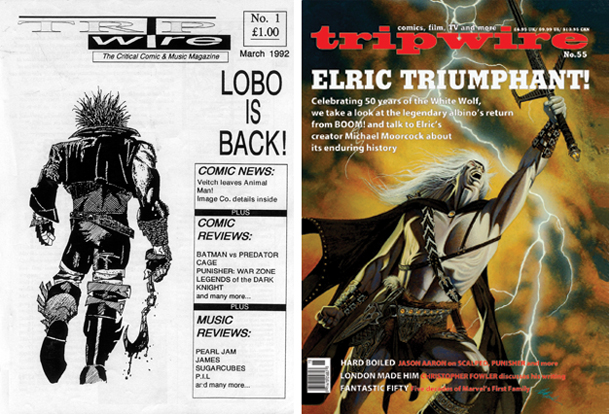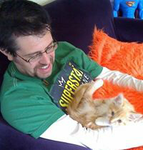BLOG 20 Years of Tripwire with Joel Meadows
Alasdair Stuart interviews the editor of the one of the most respected comics fanzines

Tripwire has been a mainstay of the comics journalism scene for two decades, a magazine that consistently put out some of the most interesting, innovative and accessible comics journalism on the market. The role of magazines like Tripwire can’t be overstated, firstly because it bridges the gap from the pre to the post-internet age and secondly because the need to dissect comics, to break them down and learn from them, lies at the heart of most comic creators. You learn by taking apart and rebuilding, and Tripwire is one of the few places that helps you do this without clubbing you round the head with an agenda or how clever they are.
To celebrate the 20th anniversary, editor Joel Meadows is seeking funding for an anniversary collection through Unbound Books . I talked to him about the magazine’s history, the anniversary edition and his plans for the future.
Tell us a little about how Tripwire got started.
“ Tripwire started life as a comics and music fanzine that I did with my ex-neighbour back in 1992, a magazine that would cover both subjects in an interesting and irreverent way. We ditched the music in 1999 and got another friend, Gary Marshall, on board, who brought film and TV to the mix. We did take a break between 2003 and 2007 when we got shafted by our news trade distributor in the UK. In 2007 we decided to bring it back as a once a year Annual and we have done five in that format.”
When's this year's out? Do you have any pieces already lined up for it?
“The plan is to get the book out by the end of the year but that depends on how much we get the hardcover funded. If we don't fund the hardcover, then we intend to produce a paperback. We already have a lot of images in to run in the book from some of the best artists in the industry including Howard Chaykin, Walt Simonson, Drew Struzan, Mike Mignola, Roger Langridge, Dave Taylor and Duncan Fegredo to name but a few. We have also begun to pull together writing on things like the best and worst comic movies 1992 to 2012 and the creators who have come up in the last two decades.”
What was your hope, when you first started the magazine?
Get sneak previews, exclusive competitions and details of special events each month!
“We started it just as a fanzine that would cover comics and music in an interesting way as there didn't seem to be anything around at the time that did this. I never dreamed that 20 years later, it would still play a part in my working life.”
What piece are you proudest of?
“That's a really tough question to answer. I don't know if I could pick one piece over 20 years. I am proud of things like our support of Mike Mignola, who we first interviewed back in 1996 and had an association for a long time. I think that perhaps one of our strongest issues was our Dark Knight Strikes Agai n issue back in 2001, which has a cover I still really like.”
How do you think comics journalism has changed since the magazine started?
“Unfortunately I think that comics journalism has changed to the detriment of everyone since we started. Thanks mainly to the internet, people are less concerned with accuracy and intelligence and so predominantly coverage of comics seems to be nothing more than regurgitated press releases and fannish writing. Of course, comics journalism has been affected in the same way that mainstream journalism has suffered and so I think it's just a fact of life that we are living in a world that is more superficial and vapid than it was as recently as 20 years ago. Ironically, the quality of material published, especially outside of the big companies, has gone through the roof so there's better material to cover but almost no-one seems to want to tackle it with any intelligence.” ( Apart from Comic Heroes , of course – ed .)
With that in mind, what would you look for in a comics journalism website? Given unlimited resources and time, what approach would you take?
“For me, I look for a little bit of depth and intelligence in the writing and cover subjects I am interested in. So if I was to put a quality comics site together, I would try to cover material in an intelligent and interesting fashion the same way we have tried to do in the magazine over the past two decades.”
What led to you setting up the 20th Anniversary book?
“We had finished issue #55, in august 2011, and I thought that we really should mark the anniversary with something. I really enjoyed and was very proud of the 10th anniversary book that we did back in 2002 so I wanted to try and top it.”
What are your plans for the future?
“It really depends on how the anniversary book goes. Currently we are a long way from meeting our target but it was always going to be a bit of a gamble. Money is tight and people need money to live on, so pledging on a book is probably quite low on their list. However, we are still planning to do a digital version of Tripwire before the end of the year. I still love print but it's very hard to make an independently published magazine about comics and related fields work. But I live in hope…”
The Tripwire 20th Anniversary Edition funding campaign is here: http://unbound.co.uk/books/43 .

Dave is a TV and film journalist who specializes in the science fiction and fantasy genres. He's written books about film posters and post-apocalypses, alongside writing for SFX Magazine for many years.


